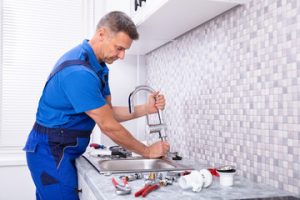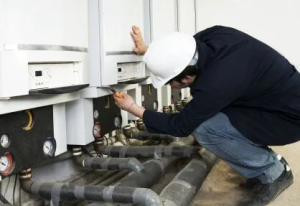Smart plumbing transforms how homeowners manage water use. With technology, leaks are now detected instantly. Digital tools help reduce water waste and avoid expensive repairs. These advancements boost the plumber’s role in today’s homes.

Modern Plumber Rosenberg TX installs intelligent sensors and Wi-Fi enabled valves. These tools offer homeowners real-time control of water flow. Alerts are sent if abnormal usage is detected. This means faster responses and less water damage.
The demand for eco-conscious plumbing is also rising. Water-saving appliances are becoming a standard choice. Plumbers help clients choose efficient systems and fixtures. This reduces bills and promotes environmental care.
3D printing is also entering plumbing material production. Custom fittings can be printed on demand. This reduces wait times and enhances precision in installation. Plumbers now work faster and with better accuracy.
Training and certifications are evolving rapidly. Modern plumbers are not only hands-on but tech-savvy. They must understand apps, software, and smart devices. Education now blends trade skills with digital literacy.
Mobile diagnostics tools are changing field service work. A plumber can scan systems before arriving at the site. This helps them bring the right tools immediately. It improves job efficiency and customer satisfaction.
Voice-controlled plumbing is another emerging trend. Homeowners use virtual assistants to control faucets. Smart showers can remember temperature settings. Plumbers must now learn to install and troubleshoot these systems.
Remote maintenance is also reshaping service. Plumbers can now guide clients via video calls. Virtual inspections help solve minor issues quickly. It saves both time and labor costs.
Greywater recycling systems are gaining traction. These reuse water from sinks and showers for irrigation. Plumbers design and install such systems with environmental goals in mind. Clients appreciate sustainable options more than ever.
Plumbing is entering the renewable energy space too. Solar-powered heaters and systems are now common. These require both plumbing and electrical expertise. Plumbers expand their knowledge to meet growing demand.
Urban vertical living creates new challenges. Apartments now stack plumbing vertically. Smart systems help manage pressure and flow. Plumbers must adapt to high-rise complexities.
Plumbers now collaborate with architects during planning. This ensures efficient water system layouts. Early involvement prevents future retrofitting. It also improves construction timelines.
Touchless plumbing is becoming widespread. Especially in public areas, this reduces germ spread. Plumbers now install motion-activated faucets and flush systems. Hygiene is a growing priority in their work.
AI-assisted diagnostics make repairs faster. Algorithms analyze water usage patterns for anomalies. Plumbers get precise data before digging or opening walls. This cuts down guesswork and damage.
Customized plumbing is also trending in luxury homes. Unique showers, steam rooms, and designer sinks require special installation. Plumbers must balance aesthetics and function. High-end services now demand artistic skills too.
The plumber’s role now includes data management. Systems track water usage, maintenance, and energy. Homeowners expect detailed reports. Plumbers provide insights beyond simple fixes.
Water quality testing is also part of modern plumbing. Clients want assurance on health and safety. Plumbers now test for contaminants and install purifiers. These services raise trust and long-term client relationships.
Smart irrigation systems require plumbing expertise. These systems optimize watering schedules for gardens. Plumbers install and sync them with weather data tools. Landscaping and plumbing now work side-by-side.
Home renovations include repiping with modern materials. Old pipes are replaced with corrosion-resistant options. Plumbers assess which upgrades best suit client needs. This prevents future leaks and improves flow.
Digital scheduling platforms support plumbers’ time management. Clients can book online or track their plumber’s arrival. These tools streamline operations for small and large firms alike. Plumbers must embrace these tools to remain competitive.
Apprenticeship programs are incorporating AR and VR. These technologies simulate real plumbing issues. Trainees get immersive experience before going to fieldwork. It enhances learning and reduces early-stage errors.
The industry is also seeing more women entering plumbing. Inclusive hiring expands the workforce and brings new perspectives. Plumbers today represent diverse backgrounds. This modern face of plumbing is reshaping old stereotypes.
Online presence matters for plumbers too. Clients search for reviews and social proof before hiring. Having updated websites and testimonials boosts trust. This online credibility is key to long-term success.
The freelance plumbing model is growing. Independent plumbers offer on-demand services via apps. Clients enjoy flexibility and quicker service. Plumbers gain autonomy and broader reach.
Greywater systems require ongoing maintenance. Plumbers educate clients on how to keep these systems efficient. Scheduled inspections ensure continued performance. It’s a service that adds recurring income potential.
Severe weather affects plumbing systems more often. Plumbers now install weather-resilient components. This includes pipe insulation and stormwater systems. Future-proofing homes becomes a new service niche.
Cross-discipline knowledge boosts plumber efficiency. Skills in HVAC and electrical systems make them more marketable. Clients prefer one expert over hiring many. It creates better business opportunities.
AI tools also help with inventory management. Plumbers know what parts they have or need in real-time. It avoids delays and unnecessary purchases. Smart stocking means more jobs done daily.
Drain maintenance goes beyond clogs. Plumbers offer pipe camera inspections now. These reveal internal pipe conditions and future risks. It ensures deeper, longer-lasting solutions.
Water pressure management is more complex than before. Multi-story homes and new appliances affect system balance. Plumbers assess and calibrate for optimal performance. This avoids long-term pipe stress and failures.
Service plans offer recurring revenue. Plumbers now offer memberships or routine checkups. Clients value preventive care and loyalty perks. It builds long-term client retention.
Emergency response has evolved with technology. Apps alert plumbers of urgent cases nearby. GPS helps optimize routing for faster arrival. This tech boosts income and responsiveness.
Water heater systems are also transforming. Tankless models are energy-saving and space-efficient. Plumbers install, maintain, and troubleshoot them. They’re now essential for modern, compact living.
Public health awareness boosts demand for quality plumbing. Clean water and proper waste disposal protect communities. Plumbers contribute to both comfort and safety. Their work impacts lives beyond the home.
Materials used are becoming more specialized. Plumbers must know which fit environmental, legal, and client needs. Some prefer biodegradable or low-impact materials. This knowledge sets skilled plumbers apart.
The future includes robotics in plumbing. Bots inspect or clean tight pipe areas. They reduce risk and improve accuracy. Plumbers learn to use and maintain these machines.
Green building standards push plumbing to adapt. Certifications often require specific water systems. Plumbers ensure buildings meet these eco-standards. Their input is vital from planning to finish.
Knowledge of codes and compliance is crucial. Laws on water systems keep evolving. Plumbers stay informed to avoid costly violations. Their expertise protects clients and their own business.
Hydronic heating is gaining interest again. These systems warm homes through water pipes. Plumbers who master them offer more specialized services. It blends plumbing with comfort tech.
AI also helps predict future plumbing issues. Algorithms learn from past breakdowns and usage. Plumbers get alerts before problems worsen. Preventive action saves time and cost.
Plumbers are becoming consultants too. They advise clients on layouts, upgrades, and sustainable practices. This advisory role earns trust. It also adds value beyond technical work.
Client education is now part of service. Plumbers teach basic maintenance or usage habits. This prevents minor issues and boosts satisfaction. Clients appreciate guidance from professionals.
The plumbing toolbox is now mostly digital. From diagnostic apps to scheduling software, tech rules. Plumbers who adopt these tools thrive more. Efficiency and accuracy become standard.
Smart kitchens are plumbing-intensive. Appliances like smart dishwashers need expert setup. Leak sensors and auto shut-offs must be aligned. The plumber ensures the tech flows smoothly.
Cold climates need extra plumbing care. Frozen pipes cause damage fast. Plumbers install freeze-proof systems. It’s a specialty that grows during harsh seasons.
Plumbers also ensure homes are flood-resistant. Sump pumps and drainage systems are essential. These are especially useful in flood-prone regions. Their role in disaster prevention is crucial.
Hybrid systems blend solar, electric, and gas water heating. Plumbers must master their integration. These setups optimize energy use. More homes are shifting to these efficient models.
Sustainability is not a trend—it’s a standard. Plumbers help households reduce water footprint. Even minor upgrades make a big difference. The plumber’s role in this movement is key.
Professionalism is still core to success. Uniforms, client respect, and punctuality matter. It sets the tone for repeat business. Clients remember experience as much as expertise.
As technology advances, plumbers will evolve further. Their work will merge with other home technologies. Adaptability is now more valuable than ever. The modern plumber is a smart, skilled problem-solver.
